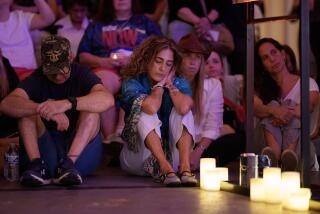Push to Complete Holocaust Record : World War II: Each year fewer survivors are left to tell their stories. Documentation is being assembled for a museum to open in Washington in 1993.
- Share via
Max Stodel took off his jacket to display the number the Nazis had tattooed on his left arm a half-century ago: 178621.
A photographer in a small room at the Century Plaza snapped a picture, recording the fact that Stodel, a retired ladies garment presser from Culver City, is a survivor of the Holocaust. The photo will become part of the collection of the United States Holocaust Memorial Museum, set to open in 1993 in Washington.
The importance of his contribution weighed heavily on Stodel, who lost his entire family--save for his nephew--to the forced labor and concentration camps of Hitler’s Third Reich.
“I want history to know that it happened,” he said Sunday. “There are so many saying that it was a hoax. But how can it be a hoax when I lost my whole family--four sisters and two brothers? We were seven.
“The only survivor is my youngest sister’s youngest son, and me. I was the youngest in the family and now I am the oldest in the family.”
Stodel, 68, was among 2,500 survivors from across the nation who came together in Century City over the weekend for a conference of Holocaust survivors, sponsored by the American Gathering of Jewish Holocaust Survivors and the national council that is charged with erecting the museum.
As with every such gathering, the event was a chance for survivors to share their stories, connect with their pasts and perhaps--always hoping against hope--find a loved one lost long ago. They flipped anxiously through hundreds of pages of a computerized registry, looking for names of family and friends: Gold, Goldfarb, Goldfield; Rosen, Rosenbach, Rosenberg. . . . Along with many were the names of the camps, some familiar, some not so well-known: Auschwitz, Bergen Belsen, Ravensbruck, Turjaremete, Weisswassen. . . .
As one woman said: “I always look. All the time, since 1940. I am looking, looking, looking, looking.”
There was also a sense of urgency about the weekend meeting, a sense that as these aging survivors grow fewer in number and as the Holocaust fades from the nation’s memory, the stories of those who lived through it must be recorded for generations to come.
“Have you had a look at them?” asked Jeshajahu Weinberg, director of the Holocaust museum, waving his hand toward the crowd. “Look how old they are. We are coming very quickly nearer to the point where there won’t be survivors around.”
Thus, the museum has embarked on a program of videotaping survivors as they tell their stories. The response has been overwhelming. Over the weekend, hundreds of conference participants filled out forms and engaged in brief screening interviews. Later, the museum staff will record interviews with those whose stories are of historical significance.
Among those screened Sunday were Helen Balsam, 63, and her husband Irving, 66, of Riverdale, N.Y. Their stories, though horrifying, were not unique; they could have been repeated in various forms by many in the crowd.
Irving Balsam told of how he and 20 others were forced to lie in a mass grave as Nazi officers fired a torrent of bullets at them. When they learned their shots had missed him, the officers tried again. But they ran out of ammunition.
His wife recounted how she discovered her father--thin, weak and barely alive--in a labor camp in Germany, where she was working in a textile factory. Risking death, she secreted away little bits of cloth for him, hiding them until she had enough to make him a shirt.
“He put on that shirt and it was noticed, and he was terribly beaten up,” she told her interviewer. “They made him say from where he got the shirt. I was yelled at and beaten. . . . The shirt incident passed and they didn’t kill him, but we were taken out on the Death March and I lost him. He didn’t survive.”
The Balsams are anxious to talk of their past. Irving Balsam, president of a survivors group in New York, said he frequently speaks to students. As he and his wife grow older, they worry about what history books will say about the Holocaust.
“We are worried,” he said, “that after our generation will be gone, there will be people, the revisionists, who will revise history and there will be no more living survivors like us to challenge them.”
More to Read
Sign up for Essential California
The most important California stories and recommendations in your inbox every morning.
You may occasionally receive promotional content from the Los Angeles Times.










